
In law, cross-examination is the interrogation of a witness called by one's opponent. It is preceded by direct examination and may be followed by a redirect. Redirect examination, performed by the attorney or pro se individual who performed the direct examination, clarifies the witness' testimony provided during cross-examination including any subject matter raised during cross-examination but not discussed during direct examination. Recross examination addresses the witness' testimony discussed in redirect by the opponent. Depending on the judge's discretion, opponents are allowed multiple opportunities to redirect and recross examine witnesses.
A court-martial or court martial is a military court or a trial conducted in such a court. A court-martial is empowered to determine the guilt of members of the armed forces subject to military law, and, if the defendant is found guilty, to decide upon punishment. In addition, courts-martial may be used to try prisoners of war for war crimes. The Geneva Conventions require that POWs who are on trial for war crimes be subject to the same procedures as would be the holding military's own forces. Finally, courts-martial can be convened for other purposes, such as dealing with violations of martial law, and can involve civilian defendants.
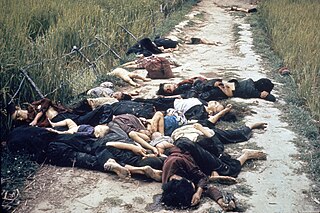
The Mỹ Lai massacre was the mass murder of unarmed South Vietnamese civilians by United States troops in Sơn Tịnh District, South Vietnam, on 16 March 1968 during the Vietnam War. Between 347 and 504 unarmed people were killed by U.S. Army soldiers from Company C, 1st Battalion, 20th Infantry Regiment and Company B, 4th Battalion, 3rd Infantry Regiment, 11th Brigade, 23rd (Americal) Infantry Division. Victims included men, women, children, and infants. Some of the women were gang-raped and their bodies mutilated, and some mutilated and raped children who were as young as 12. Twenty-six soldiers were charged with criminal offenses, but only Lieutenant William Calley Jr., a platoon leader in C Company, was convicted. Found guilty of murdering 22 villagers, he was originally given a life sentence, but served three-and-a-half years under house arrest after President Richard Nixon commuted his sentence.
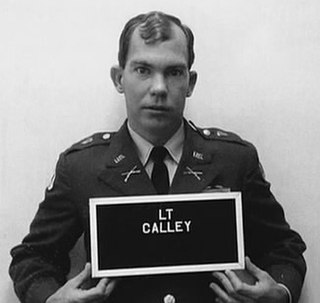
William Laws Calley Jr. is a former American army officer and war criminal convicted by court-martial for the premeditated killings of 200 to 400 unarmed South Vietnamese civilians in the Mỹ Lai massacre on March 16, 1968, during the Vietnam War. Calley was released to house arrest under orders by President Richard Nixon three days after his conviction. A new trial was ordered by the United States Court of Appeals for the Fifth Circuit but that ruling was overturned by the Supreme Court. Calley served three years of house arrest for the murders. Public opinion about Calley was divided.

The Central Criminal Court of England and Wales, commonly referred to as the Old Bailey after the street on which it stands, is a criminal court building in central London, one of several that house the Crown Court of England and Wales. The street outside follows the route of the ancient wall around the City of London, which was part of the fortification's bailey, hence the metonymic name.

A prosecutor is a legal representative of the prosecution in states with either the common law adversarial system or the civil law inquisitorial system. The prosecution is the legal party responsible for presenting the case in a criminal trial against an individual accused of breaking the law. Typically, the prosecutor represents the state or the government in the case brought against the accused person.

The Crown Court of England and Wales is, together with the High Court of Justice and the Court of Appeal, one of the constituent parts of the Senior Courts of England and Wales. It is the highest court of first instance in criminal cases; however, for some purposes the Crown Court is hierarchically subordinate to the High Court and its Divisional Courts.

A mock trial is an act or imitation trial. It is similar to a moot court, but mock trials simulate lower-court trials, while moot court simulates appellate court hearings. Attorneys preparing for a real trial might use a mock trial consisting of volunteers as role players to test theories or experiment with each other. Mock trial is also the name of an extracurricular program in which students participate in rehearsed trials to learn about the legal system in a competitive manner. Interscholastic mock trials take place on all levels including primary school, middle school, high school, college, and law school. Mock trial is often taught in conjunction with a course in trial advocacy or takes place as an after school enrichment activity. Some gifted and talented programs may also take place in one.

Francis Lee Bailey Jr. was an American criminal defense attorney. Bailey's name first came to nationwide attention for his involvement in the second murder trial of Sam Sheppard, a surgeon accused of murdering his wife. He later served as the attorney in a number of other high-profile cases, such as Albert DeSalvo, a suspect in the "Boston Strangler" murders, heiress Patty Hearst's trial for bank robberies committed during her involvement with the Symbionese Liberation Army, and US Army Captain Ernest Medina for the My Lai Massacre. He was a member of the "Dream Team" in the trial of former football player O. J. Simpson, who was accused of murdering Nicole Brown Simpson and Ron Goldman.

The judicial system of Israel consists of secular courts and religious courts. The law courts constitute a separate and independent unit of Israel's Ministry of Justice. The system is headed by the President of the Supreme Court and the Minister of Justice.

Irving Younger was an American lawyer, law professor, judge, and writer. He is well known among lawyers and law students for his energetic talks on effective trial advocacy and legal history.
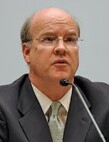
Robert James "Bob" Conrad Jr. is a United States district judge of the United States District Court for the Western District of North Carolina. He was the District's former Chief Judge (2006–2013) and a former nominee to the United States Court of Appeals for the Fourth Circuit to take the place of the retired James Dickson Phillips Jr. He is a former member of the Executive Committee of the Judicial Conference of the United States (2016–2020).
Michael Edward Tigar is an American criminal defense attorney known for representing controversial clients, a human rights activist and a scholar and law teacher. Tigar is an emeritus (retired) member of the Duke Law School and American University, Washington College of Law faculties. He was on the faculty of the University of Texas School of Law from 1983-1998, serving as the Joseph D. Jamail Centennial Chair in Law for much of that time.

Superior orders, also known as the Nuremberg defense or just following orders, is a plea in a court of law that a person, whether a member of the military, law enforcement, a firefighting force, or the civilian population, should not be considered guilty of committing actions that were ordered by a superior officer or official.
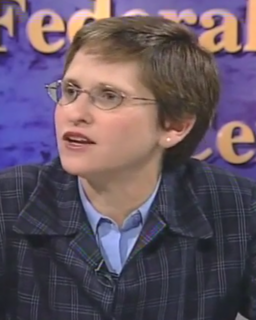
Laurie Lou Levenson is a Professor of Law, William M. Rains Fellow, the David W. Burcham Chair in Ethical Advocacy, and Director of the Center for Legal Advocacy at Loyola Law School of Loyola Marymount University in Los Angeles. She teaches evidence, criminal law, criminal procedure, ethics, anti-terrorism, and white collar crime. She served as Loyola’s Associate Dean for Academic Affairs from 1996-1999. In addition to her teaching responsibilities, she is the Director of the Loyola Center for Ethical Advocacy. She received the 2003 Professor of the Year awards from both Loyola Law School and the Federal Judicial Center.
In an inquisitorial system of law, the examining magistrate is a judge who carries out pre-trial investigations into allegations of crime and in some cases makes a recommendation for prosecution. The exact role and standing of examining magistrates varies by jurisdiction. Common duties and powers of the examining magistrate include overseeing ongoing criminal investigations, issuing search warrants, authorizing wiretaps, making decisions on pretrial detention, interrogating the accused person, questioning witnesses, examining evidence, as well as compiling a dossier of evidence in preparation for trial.
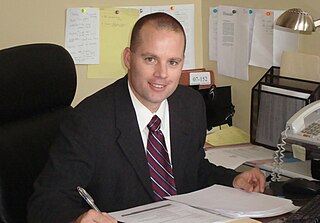
David Edward Coombs is a United States military defense counsel known for his role in several high-profile cases.
The Judge Advocate General's Corps, also known as JAG or JAG Corps, is the military justice branch or specialty of the U.S. Air Force, Army, Coast Guard, Marine Corps and Navy. Officers serving in the JAG Corps are typically called judge advocates.

Richard Kling is a Clinical Professor of Law at the Chicago–Kent College of Law in Chicago, Illinois, where he has been teaching since 1981. He teaches evidence, forensic science, and professional responsibility. He has personally tried over 500 jury trials, including 28 capital cases, and currently has a full-time Clinical Criminal practice through the Law Offices of the Chicago-Kent College of Law. Richard Kling is well respected in the Chicago legal community and is regularly featured in Chicago local news to discuss legal news topics ranging from the Rod Blagojevich corruption charges to the Drew Peterson murder trial.
The Judiciary of Sri Lanka are the civil and criminal courts responsible for the administration of justice in Sri Lanka. The Constitution of Sri Lanka defines courts as independent institutions within the traditional framework of checks and balances. They apply Sri Lankan Law which is an amalgam of English common law, Roman-Dutch civil law and Customary Law; and are established under the Judicature Act No 02 of 1978 of the Parliament of Sri Lanka.














